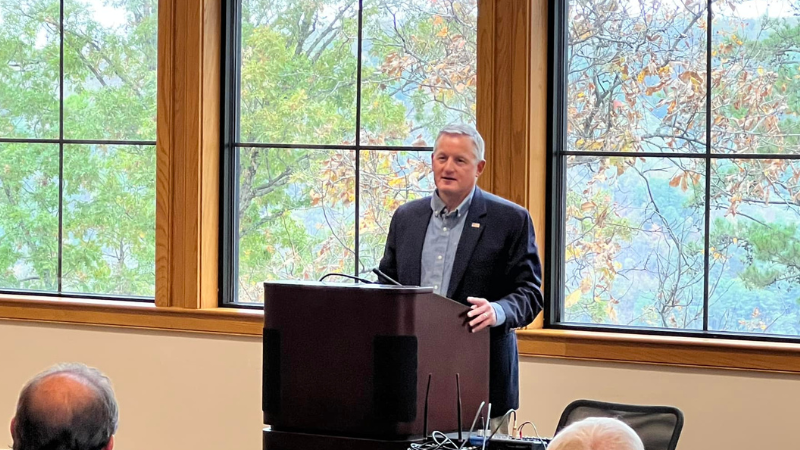The U.S. House Committee on Natural Resources Chairman U.S. Rep. Bruce Westerman (R-Arkansas) said during an oversight hearing held on Feb. 8 that he wants Americans to get the message that the U.S. is blessed with resources that can be developed.
Described as “the first step of many,” the hearing “Unleashing America's Energy and Mineral Potential” gave Republican members the opportunity to discuss opening access to domestic energy and minerals, streamlining permitting processes and engaging with Americans on ways to conserve resources, a statement on the hearing said.
“There may be a narrative out there that, and I know from some of the organizational meetings we’ve had, that Republicans only care about the bottom-line ...that we don’t care about the environment,” Westerman said during the hearing, according to a video. “I would say that’s contrary to the truth. Republicans care about the environment and the economy, and we know that if we produce more of these products here at home, we benefit both. We benefit both greatly.”
Americans developing energy can make “the cleanest, safest, most effective use of resources in the world,” while promoting human rights, providing people with the necessities of life and opportunities for improvement, Westerman said.
The Energy Information Administration predicted a global increase of 50% in energy consumption by 2050, “with petroleum and other liquid fuels remaining the largest energy source, and natural gas consumption increases expected as well,” a memo on the hearing said.
Increasing U.S. production of energy will help limit importation from other countries, reduce energy costs, create American job and help U.S. allies, the memo said.
The memo cited three directives from the Biden Administration “that severely impacted oil and natural gas development on federal lands and drove up energy prices for American families”: Secretarial Order 3395 (Temporary Suspension of Delegated Authority), Executive Order 13990 (Protecting Public Health and the Environment and Restoring Science to Tackle the Climate Crisis) and Executive Order 14008 (Tackling the Climate Crisis at Home and Abroad).
“… we've seen the Biden administration deal blow after devastating blow to our resources, crippling communities that depend on energy jobs and revenues, weakening us on the global stage and threatening our long-term energy security,” Westerman said in the statement following the Feb. 8 hearing.
“It's horrifying to see China, Russia, Venezuela and other adversarial nations cashing in on President Biden's refusal to unlock American energy and minerals.”
The House’s Republican majority will hold the Biden administration accountable for their actions and will offer solutions, Westerman said in the statement.
The hearing also covered hard rock minerals including copper, lithium, and cobalt that are used in smart phones, missile defense systems, renewable energy technology and more, the memo said.
The rising demand for renewable energy technology corresponds with an increasing demand for those minerals, which must be mined.
“To achieve net-zero emissions globally by 2050, for instance, the world would require a sixfold increase in mining by 2040,” the memo said.
The U.S. can support domestic production or allow foreign nations to dominate the global market, the memo said.
In 2021, the U.S. imported $160 million worth of “rare-earth compounds and metals,” an increase from $109 million in 2020, a report from the U.S. Geological Survey said. Of the imported “rare-earth compounds and metals,” 78% came from China from 2017 to 2020.
China “unquestionably” controls mineral supply chains for raw materials and refined products, the memo said. Among obstacles to mining hard rock minerals in the U.S. are high upfront capital costs for exploration and lags in permitting that delay production.
The Biden administration stopped some domestic mining projects, including the January 2022 cancellation of “decades-old” leases in the Superior National Forest in Minnesota and the withdrawal process for 225,378 acres of mineral-rich land, with the finalized withdrawal announced in January.
“These actions specifically targeted a prospective copper-nickel-cobalt mine in the region, despite years of environmental review, a pending Mine Plan of Operations at the Bureau of Land Management, and a myriad of comments and letters from Members of Congress, mineral developers, local residents, union workers, and many other parties stating their support for the project,” the memo said.
Several mining projects in the U.S. are challenged by environmental regulations despite the Biden Administration’s efforts to increase domestic production of such materials as lithium needed to decrease reliance on materials from China and Russia, Greenwire said. China dominates the global supply chain of metals that electric vehicles need such as lithium, nickel, cobalt, graphite and manganese. However, the Biden administration has approved few mines proposed on federal lands.
“The actions we have seen from the administration have really been contrary to providing that domestic mineral production,” Mark Compton, executive chairman for the American Exploration and Mining Association told Greenwire. “Right now, permitting is still creating an unfavorable environment for attracting mining investment in the United States.”
U.S. Rep. Pete Stauber (R-Minnesota), who according to a press release introduced H.R. 209 “Permitting for Mining Needs (PERMIT-MN) Act” that would “streamline the permitting process for mining projects” and secure the U.S.’ domestic supply chains. Bill supporters are the National Mining Association, American Exploration and Mining Association, National Association of Building Trades Unions and the Uranium Producers of America.
Witnesses who testified at the hearing, according to the memo, included Kathleen Sgamma, president of Western Energy Alliance; Erik Milito, president of the National Ocean Industries Association; JC Sandberg, the chief advocacy officer of American Clean Power; Brian Somers, president of the Utah Mining Association; and Michael Hollomon II, a board member and commercial director of U.S. Strategic Metals.









